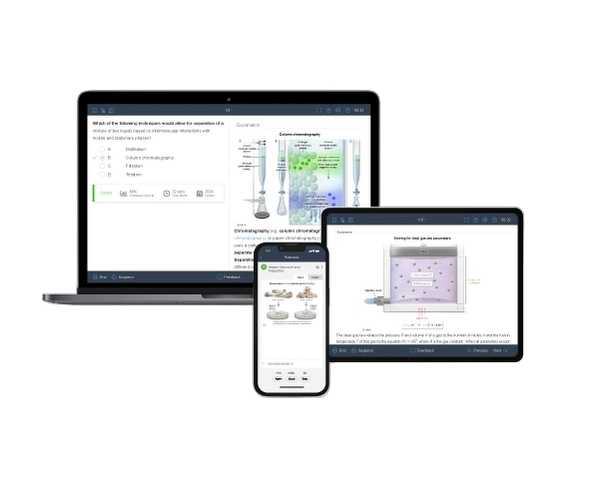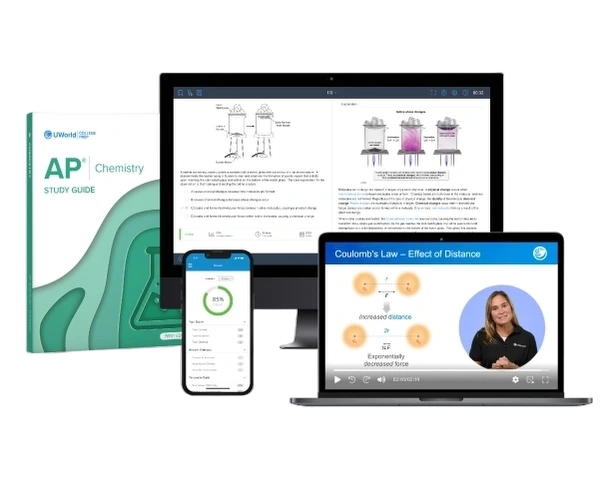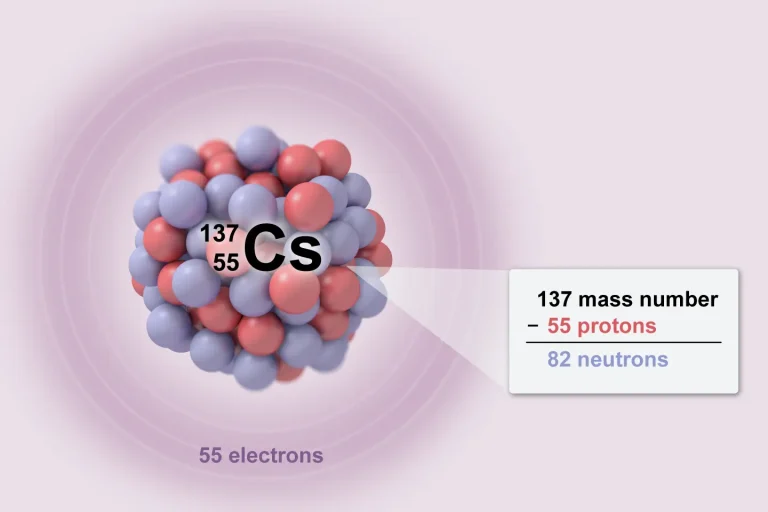Success on the AP® Chemistry exam comes down to smart preparation and consistent practice. Following are some essential tips on how to pass the AP Chemistry exam with your desired score, strengthen your knowledge, refine your problem-solving skills, and boost your test-day confidence.
What Topics Are Covered in AP Chemistry?
The AP Chemistry exam consists of 2 sections: multiple-choice (MCQ) and free-response (FRQ) questions, each constituting 50% of your final score. The MCQ section includes 60 questions to be completed in 1 hour and 30 minutes, and the FRQ section has 7 questions lasting for 1 hour and 45 minutes.
Here is a breakdown of the AP Chemistry units with their respective weights on the exam:
- Unit 1: Atomic Structure and Properties (7-9%)
- Unit 2: Compound Structure and Properties (7-9%)
- Unit 3: Properties of Substances and Mixtures (18-22%)
- Unit 4: Chemical Reactions (7-9%)
- Unit 5: Kinetics (7-9%)
- Unit 6: Thermochemistry (7-9%)
- Unit 7: Equilibrium (7-9%)
- Unit 8: Acids and Bases (11-15%)
- Unit 9: Thermodynamics and Electrochemistry (7-9%)
For a comprehensive coverage of the course content, check out our AP Chemistry course and exam description (CED).
How to Get a 3, 4, or 5 on the AP Chemistry Exam
Preparing for the AP Chemistry exam requires more than classroom learning. You need effective independent study. Here's how to study for AP Chemistry:
- Staying engaged before and during classroom learning: Before your AP Chemistry class, quickly skim through your reading assignment and then watch related video lessons. Focus on anything unclear, and jot down questions to ask your teacher in class. During your class, pay attention to your teacher's explanations, ask questions when you're confused, and take clear notes.
- Building a Strong Foundation: AP Chemistry builds on previous concepts, so don't skip any topic. For example, you won't be able to tackle stoichiometry (covered in Unit 4) if you don't fully grasp moles and molar mass (taught in Unit 1). Also, remember that AP Chemistry labs are important for building scientific reasoning and data analysis skills, so give them extra attention. Use resources like the College Board® lab manual for more practice.
- Using Study Resources Effectively: Complete practice questions from a quality AP Chemistry resource such as UWorld that mirror the format and difficulty of the real AP exam and also include detailed explanations for right and wrong answers, helping you spot trick answers and build critical thinking skills.
- Enhancing Concept Retention: If you're struggling with certain AP Chemistry concepts, creating UWorld flashcards on challenging topics can help. An evidence-based strategy, spaced repetition, shows you tough topics more frequently until you master them. This method helps you learn faster and remember longer by focusing on the areas where you need the most practice. In addition, use a UWorld virtual notebook to rewrite and organize your notes daily. Add diagrams, visuals, and mnemonics to help with memory.
- Maximizing Practice Sessions: Team up with classmates who are just as motivated to ace the AP Chemistry exam. Keep study sessions focused — don't let them turn into hangouts. Quiz each other with AP-level practice questions, share flashcards, and take turns explaining tough topics. You can even grade each other's FRQs and discuss them after. Stay accountable and motivated to reach your goals!
AP Chemistry Quality Study Resources
Since many resources are available in the market, deciding which one to use can be confusing. We have compiled a list of AP Chemistry quality study resources to help you elevate your test prep and scores.
- AP Classroom : An online platform run by the College Board to provide AP Chemistry unit guides, question bank, assignments, and other resources to help students
- AP Daily Videos : Youtube videos by College Board's AP teachers focusing on different AP Chemistry topics, units, and questions.
- Past Exam Questions : AP Chemistry FRQs and scoring criteria from previous exams published by the College Board.
- Quality Prep Courses: Use UWorld's AP Chemistry prep course, which comes with a comprehensive study guide and an extensive question bank to help students achieve their desired scores. UWorld also offers digital study tools such as flashcards, notebooks, a built-in timer, a calculator, and a progress tracker to help students maximize their retention of concepts and keep their performance in check.

AP Chemistry Study Plan and Exam Tips
The AP Chemistry exam is approaching fast! No matter where you are in your prep, these practical AP Chemistry exam tips will help you stay on track. Follow this simple study plan to maximize your success.
- Begin in February to ensure ample time to cover all units.
- Units 1–2 (Atomic and Molecular Structure): Spend 1 week.
- Unit 3 (Properties of Substances and Mixtures): Spend 2 weeks.
- Units 4–5 (Chemical Reactions & Kinetics): Spend 2 weeks.
- Units 6–7 (Thermochemistry & Equilibrium): Spend 2 weeks.
- Unit 8 (Acids and Bases): Spend 1 week.
- Unit 9 (Thermodynamics and Electrochemistry): Spend 1 week.
- Refresh your understanding using your textbook or UWorld's AP Chemistry Study Guide.
- Set aside two to three short sessions each week to review MCQ-style practice questions.
- Consistently revisit challenging concepts.
- Start timing your MCQs to match exam conditions: Aim for 30-40 seconds per question.
- Review past FRQs from College Board to familiarize yourself with potential essay questions.
- Outline and practice writing responses at least twice a month.
- Time yourself to adapt to the exam pace.
- Create and review flashcards daily for key formulas and rules.
- Regularly schedule breaks to stay refreshed — plan a day off each week or take an afternoon off when necessary.
- Start with a general review of course topics, unit by unit at a quicker pace.
- Utilize resources such as textbooks, class notes, and course materials for concept refreshers.
- Prioritize completing textbook practice problems and using the UWorld's AP Chemistry Practice Test QBank two to three times per week for 20-30 minutes per study session.
- With UWorld: To save time, focus on explanations for missed questions reviewing the concepts that need the most improvement.
- Units 1–3 (Atomic Structure, Molecular Structure, Properties of Substances/Mixtures): Allocate 1 week.
- Units 4–6 (Reactions, Kinetics, Thermochemistry): Allocate 1 week.
- Units 7–9 (Equilibrium, Acids/Bases, Thermodynamics/Electrochemistry): Allocate 1 week.
- Use any remaining time to review concepts from each unit which you missed previously to reinforce learning.
Kick off your study by tackling a few UWorld AP Chemistry MCQs in each topic to spot the ones that are harder to you. Dive into the explanations for any questions you miss. If you're still feeling shaky, watch a video or review your notes on those tough topics. Then, circle back with more UWorld questions to see how much you've improved!
Spend most of your week diving into FRQs — they're a great way to cover lots of topics at once and are really efficient for review. Plus, they make you show your work, which helps you get a solid handle on the whole problem-solving process.
When to Start Preparing for AP Chemistry
Since every student has different goals, study schedules, and learning styles, the ideal time to start preparing for the AP Chemistry exam varies for everyone. Below, we have put together different types of test takers to help you determine the best time to start preparing for your exam.
| Type of Test-taker | Description | Recommended Timeframe |
|---|---|---|
| Busy | Students who have very tight schedules and need longer periods of time to prepare but shorter sessions that fit seamlessly into their hectic lives. | 180 to 360 days (For those juggling between multiple subjects) |
| At a Plateau | Students who are stuck at specific scores and are looking for targeted practice to work on their areas of improvement and achieve their dream score. | 30 to 90 days (For improving scores by drilling hard questions and fine tuning) |
| Just Getting Started | Students who want to get a feel of the exam by laying the foundation and building their knowledge. | 30 to 90 days (For feeling confident about taking the exam from Day 1) |
| Not a “Good Test Taker” | Students who want to get comfortable with the course content and overcome the pitfalls of MCQs and FRQs with strategic practice. | 180 to 360 days (For navigating trick questions and turning knowledge into high scores) |
| Retaking the Exam | Students who already know their areas of improvement but want to score better than their last attempt with strategic and focused practice. | 30 to 90 days (For turning past mistakes into stepping stones for success) |
| Stressed by the Clock | Students who want to get comfortable with the duration of the exam and avoid common mistakes by developing time management skills. | 90 to 180 days (For managing stress and ensuring peak performance) |
How to Take the Exam With Confidence
You have gone through the AP Chemistry class, studied hard, completed practice questions, and read through everything in your notebook. Now, it's time to take the next and final step.
Here are some AP Chemistry exam tips to help you prepare for the test day.
- Make a List of Items to Bring on Test Day: Be sure to pack black or dark blue ink pens and a scientific or graphing calculator for the FRQ section. Dress comfortably and remember to carry something to eat and drink during the break.
- Avoid Last-Minute Studying on the Day Before the Exam: Last-minute cramming before the exam can increase your stress. Instead, focus on getting into the right mindset. Take a walk to help ease your mind and relax and go to bed at a reasonable time.
- Eat Right and Stay Hydrated on Test Day: Eat a well-balanced breakfast and keep yourself hydrated. Avoid foods containing lots of sugar, since spikes and drops in your blood sugar could interfere with your ability to perform your best when taking the exam.
- Minimize Anxiety on Test Day: Arrive at the test site early so that you have time to use the restroom before the exam. If you feel nervous, practice deep breathing and picture positive peaceful scenarios to stay calm. Throughout the exam, focus on what you are doing and tune out any distractions from others around you.
Now that you've learned how to study for AP Chemistry, it's time to practice. Passing the AP Chemistry exam requires dedication and hard work. With the right study materials and an effective study schedule, it is possible to achieve your goal. Good luck!

Frequently Asked Questions (FAQs)
Which AP Chemistry units are the most difficult to learn?
According to the 2024 AP Chemistry exam results, students found Units 6, 7, and 9 the most challenging, with only 20% of test-takers answering questions on these topics correctly. To master difficult topics, enroll in a high-quality test prep course like UWorld to clear up doubts and boost your score.
How do I self-study for the AP Chemistry Exam?
Self-studying for the AP Chemistry exam requires a structured plan, reliable resources, and consistent practice. Check out our AP Chemistry self-study guide for expert tips and strategies.
References
- AP Chemistry: About the Course. (2025). apstudents.collegeboard.org. Retrieved February 21, 2025 from https://apstudents.collegeboard.org/courses/ap-chemistry
- AP Chemistry: About the Exam. (2025). apstudents.collegeboard.org. Retrieved February 21, 2025 from https://apstudents.collegeboard.org/courses/ap-chemistry/assessment
- AP Chemistry Course and Exam Description. (Fall 2024). apcentral.collegeboard.org. Retrieved February 21, 2025 from https://apcentral.collegeboard.org/media/pdf/ap-chemistry-course-and-exam-description.pdf
- Trevor Packer (@AP_Trevor). (June 18, 2024). x.com. Retrieved February 21, 2025 from https://x.com/AP_Trevor/status/1802809549444833629
Read More Related Articles
Struggling with AP Chemistry multiple-choice questions? Learn expert strategies to analyze questions, eliminate wrong answers, and improve your accuracy.
How to Answer AP Chemistry FRQsLearn how to tackle AP Chemistry free-response questions like a pro! Get expert tips on showing work, applying formulas, and avoiding common mistakes.
AP Chemistry LabsGet hands-on with AP Chemistry labs! Explore essential experiments, lab techniques, and data analysis strategies to boost your understanding of concepts.
Best AP Chemistry Study Guide ComparisonFind the perfect AP Chemistry study guide for yourself! Compare top options by strengths, formats, price, and key features to master every Chemistry unit.
How to Self-Study for AP ChemistryAre you self-studying for AP Chemistry? Get expert guidance on how to organize your study schedule, tackle difficult topics, and prepare for the exam day.
Best AP Chemistry Prep Course ComparisonWhich AP Chemistry prep course is best for you? Discover top-rated options with expert insights into content quality, practice questions, and study tools.



